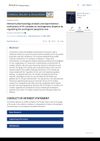1 citations,
December 2021 in “Natural Product Research” β-sitosterol and brassicasterol may help treat hair loss.
 1 citations,
October 2020 in “Current Drug Discovery Technologies”
1 citations,
October 2020 in “Current Drug Discovery Technologies” The research found that compound 6, a newly created steroid, is more effective at inhibiting 5α-reductase (an enzyme) than current treatments, suggesting it could be a better option for treating urinary tract symptoms in men.
 1 citations,
August 2020 in “Food Research”
1 citations,
August 2020 in “Food Research” Plant extracts like Avicennia marina, Boehmeria nipononivea, and Camellia sinensis could potentially treat hair loss with fewer side effects than synthetic drugs.

The conclusion is that hair supplement ingredients may be unsafe and should be disclosed and proven safe before use.
 1 citations,
October 2019 in “مجله كليه طب الكندي”
1 citations,
October 2019 in “مجله كليه طب الكندي” Dapsone gel 5% is effective and safe for treating acne.
 1 citations,
January 2019 in “Springer eBooks”
1 citations,
January 2019 in “Springer eBooks” Hidradenitis Suppurativa is a chronic skin condition best treated early with surgery for better outcomes and less recurrence.
1 citations,
August 2017 in “The Journal of urology/The journal of urology” 5α-reductase inhibitors may increase the risk of depression and suicidal thoughts.
1 citations,
August 2016 in “Hanbang an'i'bi'in'hu pibu'gwa haghoeji” YangHyulEum Gami-Bang extract may help treat hair loss.
 1 citations,
February 2014 in “Archiv Der Pharmazie”
1 citations,
February 2014 in “Archiv Der Pharmazie” Carbamates may help treat androgen-dependent conditions by changing how certain lipid enzymes are produced.
 1 citations,
January 2014 in “Hair therapy & transplantation”
1 citations,
January 2014 in “Hair therapy & transplantation” The combination therapy of PEG-IFN α-2a and Ribavirin can cause widespread hair loss and skin reactions.
 1 citations,
January 2010 in “Elsevier eBooks”
1 citations,
January 2010 in “Elsevier eBooks” Any drug can cause skin reactions, but antibiotics, NSAIDs, and psychotropic drugs are more common, with some reactions being life-threatening.
 1 citations,
August 2002 in “Zeitschrift für Hautkrankheiten”
1 citations,
August 2002 in “Zeitschrift für Hautkrankheiten” Male androgenetic alopecia involves hair follicle miniaturization due to DHT, with potential treatments using inhibitors and blockers.
 1 citations,
March 1997 in “Journal of Chromatography B: Biomedical Sciences and Applications”
1 citations,
March 1997 in “Journal of Chromatography B: Biomedical Sciences and Applications” Researchers developed a method to measure different forms of a drug that could help treat prostate issues and hair loss, and found how these forms behave in animals.
 November 2024 in “Applied Sciences”
November 2024 in “Applied Sciences” Wild strawberry waste extract can be a sustainable cosmetic ingredient for treating acne and hair loss.
 September 2024 in “International Journal of Molecular Sciences”
September 2024 in “International Journal of Molecular Sciences” Hydrangea serrata extract may promote hair growth and improve hair health.
August 2024 in “Cosmetics” Personalized treatments for hair loss are becoming more effective by using genetic information.
August 2024 in “Cosmetics” Peanut callus extract helps grow hair and prevent hair loss.
 July 2024 in “Biological and Pharmaceutical Bulletin”
July 2024 in “Biological and Pharmaceutical Bulletin” Licorice extract helps hair growth and may treat hair loss.

Higher doses of 5α-reductase inhibitors reduce mortality risk, while lower doses increase suicide risk.
July 2024 in “Fitoterapia” Camellia oleifera seed shell polyphenols and 1,3,6-tri-O-galloylglucose can help treat hair loss by reducing certain hormones and promoting hair growth.
June 2024 in “Journal of Drug Delivery Science and Technology” Nanocarrier-based treatments show promise for better hair growth in androgenetic alopecia but need more research.
 May 2024 in “EAS Journal of Pharmacy and Pharmacology”
May 2024 in “EAS Journal of Pharmacy and Pharmacology” Pomegranate peel compounds may help treat hair loss.
 May 2024 in “Journal of cosmetic dermatology”
May 2024 in “Journal of cosmetic dermatology” Heat-treated Limosilactobacillus fermentum with menthol, salicylic acid, and panthenol promotes hair growth and balances scalp microbiome in people with androgenetic alopecia.
 February 2024 in “International Journal of Molecular Sciences”
February 2024 in “International Journal of Molecular Sciences” Hair loss in Androgenetic Alopecia is caused by genetics, aging, and lifestyle, leading to hair follicle shrinkage and related health risks.

The YH complex, made from certain plant extracts, effectively promotes hair regrowth and could be a potential treatment for hair loss.
 January 2024 in “Journal of Medicinal Food”
January 2024 in “Journal of Medicinal Food” Rambutan extract can help reverse hair loss caused by testosterone.
 January 2024 in “Journal of Biosciences and Medicines”
January 2024 in “Journal of Biosciences and Medicines” Future treatments for androgenic alopecia may focus on reactivating hair follicle stem cells and improving drug delivery.

Fructus Psoraleae may help treat hair loss by inhibiting 5-α reductase and affecting the Nrf2-Keap1 pathway.
 December 2023 in “Revista Urología Colombiana / Colombian Urology Journal”
December 2023 in “Revista Urología Colombiana / Colombian Urology Journal” More research is needed to find effective treatments for sickle cell disease-related priapism.
 November 2023 in “Current Dermatology Reports”
November 2023 in “Current Dermatology Reports” Oral minoxidil is effective for various hair loss types and may improve male sexual function, but aspirin can reduce its effectiveness.






















